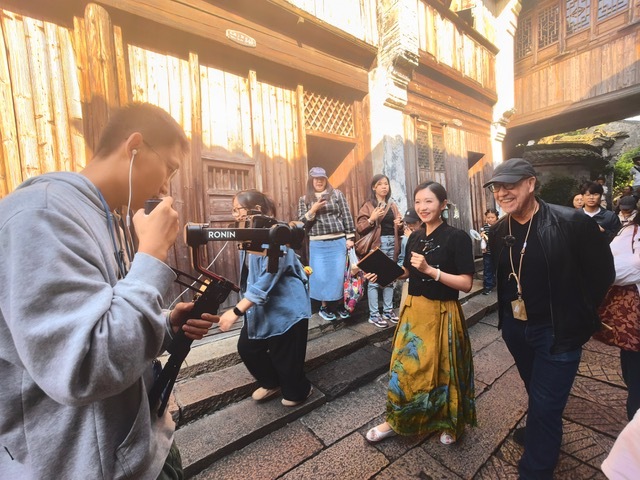
In the dynamic sphere of modern theatre, where tradition and innovation intertwine like threads in a vibrant tapestry, Travis Preston stands as a luminary whose work captivates and challenges. As a celebrated director and, until 2024, the Dean of the CalArts School of Theater and founding Artistic Director of the CalArts Center for New Performance (CNP), Preston has devoted over four decades to crafting productions that do more than entertain. He sparks reflection, disrupts conventions, and redefines the essence of storytelling. Born on September 20, 1963, in the steel-laden town of East Chicago, Indiana, Preston’s path to theatrical prominence was far from predictable. Initially immersed in a Ph.D. program in psychology at Indiana University, he underwent a profound shift in his mid-twenties, abandoning the analytical for the expressive.
At Yale School of Drama, he trained under luminaries like Andrzej Wajda and made history as the first student to direct at the Yale Repertory Theatre. His transformative time in Poland, studying under avant-garde giants Jerzy Grotowski, Tadeusz Kantor, and Józef Szajna, shaped his bold approach: weaving timeless stories with the urgency of the present.
Preston’s global influence is marked by his 2006 induction as a Chevalier of France’s Ordre des Arts et des Lettres and awards like Best Opera Production in Germany for his staging of Luigi Nono’s Al gran sole carico d’amore. His career spans residencies at Harvard’s American Repertory Theatre, the Hong Kong Academy for Performing Arts, and other prestigious institutions. Yet, what truly distinguishes him is not the accolades but his vision of theater as a living, evolving force; one that grows with its creators and audiences. In an age where digital screens dominate, Preston’s work reaffirms the power of live performance to reveal raw human truths. His diverse portfolio, encompassing Shakespearean tragedies, ancient myths, and experimental multimedia, serves as a window into complex themes of power, identity, and perseverance. As he once told CalArts students, “Theater thrives in the raw, fleeting moment of a clash of ideas that demands you be fully present.” Let’s explore his most impactful projects, where bold creativity meets human intimacy, captured in vivid stage visuals and rehearsal moments that echo his enduring vision.
Travis Preston launched the CalArts Center for New Performance with a groundbreaking take on Shakespeare’s King Lear, staged in the raw, abandoned spaces of Los Angeles’ Brewery Arts Complex. Picture a tormented king, brought to life by a rotating ensemble, moving through a maze of rusted machinery and graffiti-covered walls, the city’s industrial decay mirroring Lear’s descent into chaos. This wasn’t just a setting; it was a vital element of the tragedy, with creaking structures and distant city sounds amplifying the play’s stormy heart. Audiences wandered through the space, immersed in the drama, as actors moved among them, erasing the divide between performer and spectator.
This Lear gained international acclaim, touring to France’s Frictions Festival, where it was celebrated for its visceral intensity. Preston collaborated with composer Vinny Golia, whose score wove haunting saxophone with industrial echoes, and designer Christopher, who let the site’s raw textures speak. Drawing on Grotowski’s physical theatre, Preston crafted movements that felt like primal rituals, making betrayal and loss tangible. Critics called it “an apocalyptic reimagining”, and it earned Preston his French knighthood for blending American boldness with universal resonance. Striking images show him in rehearsals, guiding actors under stark work lights, and performers frozen in anguished poses against crumbling walls - moments that capture Preston’s gift for turning forgotten spaces into vessels of profound emotion.
If Lear was Preston's manifesto of scale, Macbeth: A Modern Ecstasy was his exercise in distillation. A solipsistic fever dream performed by a lone actor embodying the entire Scottish court. Staged at REDCAT in Los Angeles, this one-man tour de force starred Stephen Dillane, whose portrayal of Macbeth morphed seamlessly into Lady Macbeth, Banquo, even the witches through a shamanistic ritual of masks, projections, and guttural vocal shifts. Preston drew from his Polish influences here, channeling Grotowski's notion of the actor as vessel, where physical ecstasy borders on exorcism. The set was minimal: a sea of black sand lit by flickering LED "candles" that cast Dillane's sweat-slicked form in infernal reds and golds.
The production's brilliance lay in its economy. A 90 minutes of unrelenting propulsion that toured to London's Almeida Theatre and Australia's Sydney and Adelaide Festivals, leaving audiences breathless. Themes of ambition's corrosive hunger resonated acutely in the post-9/11 haze, with video interludes of crumbling towers mirroring Duncan's fall. Preston's direction emphasized sensory overload: the air thick with incense, the soundscape a cacophony of whispers building to roars. One indelible image is Dillane, mid-soliloquy, contorted in ecstatic agony, his body a canvas for projected blood-red runes, captured in production stills that show Preston offstage, eyes intent, guiding the performer's trance. This Macbeth wasn't a tragedy; it was a visceral warning, proving Preston's mastery of intimate horror on a grand psychic scale.
In 2013, Preston returned to antiquity with Aeschylus's Prometheus Bound, but through a lens of brutalist defiance that felt ripped from the headlines. Commissioned by the Getty Villa in Malibu, this world-premiere adaptation of Joel Agee's translation transformed the myth of the fire-stealing Titan into a stark allegory for whistleblowers and dissidents. Prometheus, chained to a monolithic steel wheel (evoking postwar architecture's cold permanence), was embodied by a rotating cast including alumni from CalArts' rigorous program. The Villa's sun-drenched colonnades became the Caucasus Mountains, where divine retribution played out against the Pacific's indifferent blue.
Preston's innovation was in the staging: actors harnessed to industrial harnesses, their struggles amplified by percussive Foley clanging chains like factory hammers, and a chorus of CalArts students chanting in polyphonic Greek. Themes of rebellion against tyrannical power pulsed through, with Io's torment visualized as a dancer writhing in projected flames. The production's critical acclaim stemmed from its timeliness, echoing WikiLeaks-era debates, and its visual poetry: twilight rehearsals where Preston, sleeves rolled up, adjusted rigging under golden-hour light, his face a study in focused empathy. It solidified Preston's reputation for wedding classical rigor with contemporary urgency, a bridge between Olympus and Occupy Wall Street.
Preston's most audacious leap came with Fantômas: Revenge of the Image, a multimedia phantasmagoria premiering at China's Wuzhen Theatre Festival, the "Oriental Venice" of global arts. Inspired by the early-20th-century French crime serials, this piece reimagined the elusive master-criminal Fantômas as a digital ghost haunting our surveillance-saturated world. Audiences weren't seated; they were ferried on a floating platform through a labyrinth of projections, writhing shadows, glitchy film reels, and holographic doppelgangers, while performers dangled from catwalks, voicing fragmented monologues on identity theft and voyeurism.
Collaborating with film theorist, Tom Gunning, and designer, Christopher Barreca, Preston created a kinetic ecosystem where live action intertwined with AI-generated visuals, questioning the "revenge" of images in an era of deepfakes. The 90-minute journey, accommodating just 50 viewers per run, earned raves for its sensory immersion. Captured in festival photos, Preston stands at the helm, gesturing like a puppeteer to unseen cues; his production works a symphony of light and shadow. This project encapsulated his evolution from psychological roots to tech-infused futurism—proving theater's capacity to outpace cinema in visceral wonder.
Crossing oceans once more, Preston directed Sam Shepard's Pulitzer-winning Buried Child for the Hong Kong Repertory Theatre's 40th anniversary, a brooding family saga transplanted to a neon-drenched set evoking Kowloon's crowded tenements. Shepard's Midwestern decay became a metaphor for Hong Kong's simmering unrest, with the "buried child" symbolizing suppressed histories amid protests. The cast, blending local and international talent, delivered taut, naturalistic performances under Preston's guidance.
The production's intimacy staged in the intimate Hong Kong City Theatre, allowed for raw close-ups: a rain-soaked porch where revelations dripped like monsoon tears. Preston's direction emphasized Shepard's surreal undercurrents, with dreamlike interludes of projected cornfields clashing against skyline silhouettes. Rehearsal images reveal him in quiet conference with actors, notebook in hand, coaxing vulnerability from the ensemble. Critically lauded for bridging American absurdism with Asian familial taboos, it toured regionally, affirming Preston's global fluency.
Preston's latest triumph, Augustine Machine ou Encore Une Nuit d'Insomnie, co-developed with the Paris Conservatoire National Supérieur d’Art Dramatique, premiered in 2023 as a hypnotic exploration of Freud's famous patient, Augustine, the woman whose hysteria sessions birthed psychoanalysis. Blending verbatim transcripts with mechanical puppetry, the piece unfolds in a nocturnal laboratory: performers manipulate marionettes of Augustine's fragmented psyche, their strings humming with amplified heartbeats and whispered case notes.
Staged at CalArts before its Parisian bow, this work delves into insomnia's grip, using looping projections of spinning wheels and ticking metronomes to evoke sleepless torment. Preston's touch is evident in the empathetic choreography, dancers embodying Augustine's convulsions with balletic precision drawing from his psychological background to humanize clinical detachment. Recent images from campus rehearsals show Preston encircled by students, demonstrating a gesture with gentle precision, the machine's gears glinting under work lights. As it tours Europe, this project underscores his commitment to mental landscapes, a nocturnal odyssey for our anxious age.
These projects, spanning derelict warehouses to floating barges, reveal Preston's directorial DNA: a fusion of intellectual rigor, physical daring, and empathetic precision. His collaborations amplify voices often sidelined in canon-heavy theater. Yet, Preston's impact extends far beyond his own stages. At CalArts, where he mentors BFA and MFA candidates, he champions interdisciplinary risk-taking. The CNP, under his stewardship, has incubated over 100 new works, providing students hands-on apprenticeships that propel them to Broadway and beyond. Alumni credit his "Socratic provocations" late-night seminars dissecting Grotowski alongside TikTok trends for forging their voices.
In a 2020 virtual address, Preston urged graduates: "Make theatre that haunts, that heals - make it because the world needs your unfiltered gaze." His own gaze, sharp yet compassionate, has haunted and healed audiences across continents. As digital fatigue sets in, Preston's analog alchemy of sweat, breath, collective gasp feels more vital than ever. With whispers of a new Ibsen cycle, Travis Preston isn't just directing history; he's scripting its next act. In his hands, the stage remains a forge, hammering raw human ore into enduring art.

Beyond his productions, Travis Preston’s impact shines through his mentorship at CalArts, where he nurtured talents through CNP’s 100+ projects. His teaching, blending rigorous analysis with bold experimentation, prepares students for diverse careers.
Travis Preston’s influence extends far beyond the stages he transforms; his profound legacy is rooted in his role as a mentor at the California Institute of the Arts (CalArts). Through CNP, Preston has overseen the creation of over 100 innovative works, providing a crucible for emerging artists to experiment, fail, and soar. His teaching philosophy, a blend of rigorous intellectual inquiry and fearless creative risk, empowers students to carve their own paths in theater, film, and interdisciplinary performance. By fostering an environment where traditional boundaries are questioned, Preston has nurtured talents who now grace Broadway, helm independent productions, and redefine global performance art.
As he embarks on new ventures like K City with the Hong Kong Repertory Theatre and the opera American Mother in Germany, Preston’s theater remains a beacon for truth. Vivid stage images performers in mid-gesture under stark lights and rehearsal snapshots of Preston shaping a scene with quiet intensity capture his vision: a stage where humanity’s raw pulse thrives. His legacy lies not just in his productions but in the countless artists he inspires to push theater into uncharted realms, ensuring its vitality for generations to come.